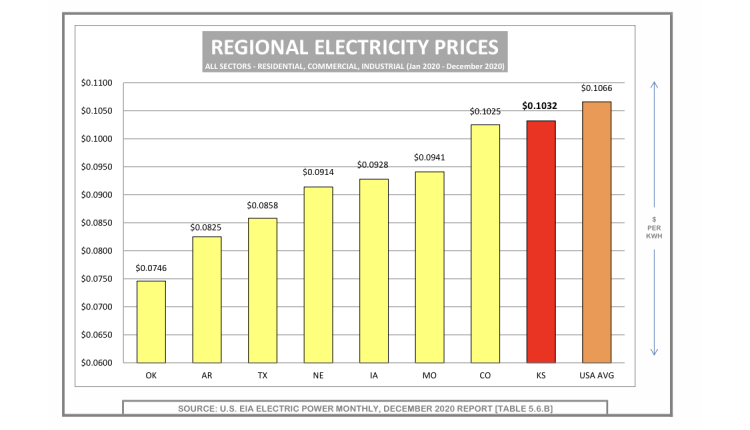Kansas has some of the highest electric utility rates in the region, with residents paying — on average — 25% more than neighboring states.
That has been a millstone around the neck of economic development in Kansas for years.
Now a petition is asking the Kansas Legislature to place a moratorium on rate hikes until a way to lower rates to a more competitive level can be devised.
The Kansas Independent Oil and Gas producers Association, which has signed on to the petition, noted that electric rates in Kansas have increased by 34% in the last decade and are higher than the regional and national averages.

Ed Cross, the president of KIOGA, said that while electricity is one of the biggest expenses for his industry — and high rates have led to the plugging of some marginal wells, with the concomitant loss of revenue to producers and the state — the high rates affect everyone.
“We’re just asking legislators to … look at putting a moratorium on increases in electric rates until the legislature can look at this and devise a plan to stem those increases,” Cross said in a recent phone interview.
Cross noted that electric rates account for 30 to 50 percent of operating costs for well operators.
“Whenever electric rates go up, it forces many wells to be plugged prematurely,” he said. “And it actually hurts the state as far as economic development.”
The oil and gas industry — while not as prominent in the state economy as it once was — still contributes $2.6 billion to the state GDP, which is not insignificant.
The Kansas Corporation Commission, which oversees electric rates in the state, currently has several pending rate cases, including from Evergy, one of the most expensive investor-owned utilities in the state.
Economic Development impacted by high rates
Having significantly higher electric rates than surrounding states also is a major drag on economic development.
Jim Zakoura of Kansas Industrial Consumers Group and Kansans for Lower Electric Rates said in an interview in early 2020 that “It’s not sustainable for Kansas to have the highest electric rates in the region,” Zakoura said. “This is foundational to our state.”
Zakoura said, as an example, they had a client who could locate around the Wichita area or they could locate around the Enid, Oklahoma area. He said the annual difference in electric costs was $5 million.
“Where do you think they’re going?” Zakoura said. “There’s only a handful of businesses who wouldn’t think a $5 million difference in electric rates wasn’t significant.”
Moreover, as the Sentinel reported in January 2021, Kansas is the sixth-highest on a list of states people are leaving — in part because of high taxes and high electric rates.
Kansas has the 8th highest state and local sales tax rate in the nation, some of the highest electric and utility rates in the region, and while state income taxes are about in the middle of the pack in the U.S., property taxes are not — with Kansas having some of the highest rural property tax rates in the country.
Fast facts about Kansas electric rates
- Kansas electric rates have increased 34% over the last 10 years, and over 70% in Evergy’s territory.
- Kansas had the 6th largest increase in electric rates out of all 50 states over a similar timeframe and Kansas went from 34th highest to 16th highest in the nation.
- Kansas utilities have far more generating assets than they need, yet more projects are being commissioned in Kansas. According to the Southwest Power Pool’s website, excess generating capacity is more than sufficient to meet peak loads — even without wind.
- Electric co-ops in Kansas also have about the highest rates in the region.

